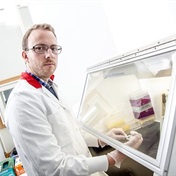Tucked away in the twisted strands of DNA that make you human are genes that may determine whether you are sociable or shy.
A new study comparing two types of twins shows that genetics might affect social behaviour, and the scientists who made the discovery say they are closing in on some of those "personality" genes.
"We're on the case," said James H. Fowler, an associate professor of political science at the University of California, San Diego, and lead author of a report in the Proceedings of the National Academy of Sciences. "We've identified some, and we're waiting for further tests for verification."
"I'd rather not discuss it just yet, but we're working on it very actively," said study co-author Dr Nicholas A. Christakis, a professor of sociology and medical sociology at Harvard University.
Genetics and upbringing shape behaviour
The new insights won't help turn a wallflower to a social butterfly, Fowler cautioned, in part because "genetic engineering is very difficult", but mostly because social behaviour stems from the interplay of genetics and upbringing.
Fowler and Christakis have done several studies on social networking, showing for example that traits such as happiness and obesity can spread through person-to-person contacts. Their latest study looked at national data on the social networks of 1 100 twins, some identical and others fraternal. They found greater similarity between the social networks of identical twins, who share the exact same genes, than those of fraternal twins, whose genes might vary slightly.
That finding is revolutionary, Fowler said. "There has been a simple model for the metabolic, neural and Internet networks, and the same model is applied to human beings - that all parts of the network are identical and interchangeable."
That assumption can no longer be made about human social network interactions, Fowler said: "There are inherent characteristics that govern where we [as individuals] gravitate to in the social network."
Your genes can influence other people
The paper describes a new "attract and introduce" model, which allows for these individual differences. That sort of model will have to replace existing models of social networks, Christakis said.
"A second implication is that the study suggests that if we really want to understand how things diffuse in social networks, we need to take into account people's locations in social networks, which are due in part to their genes," he said.
One surprising finding is that an individual's genetic makeup can influence the behaviour of others, Fowler said: "My genes can influence the probability that two of my friends will become friends of each other."
Science already has one example of the interaction between genes and environment on human behaviour, he said. Studies have found that parents who carry one variant of the MAO-A gene are more likely to engage in child abuse, he said, but that likelihood depends on whether the parent was abused as a child.
So while it might not be possible to affect a supposed gene for shyness, knowing that there is such a gene "can help us make sharper predictions about which experiences you have will have the sharpest impact on what social interactions you have." – (HealthDay News, January 2009)
Read more:
Social status impacts your health
Society blamed for school violence




 Publications
Publications
 Partners
Partners














